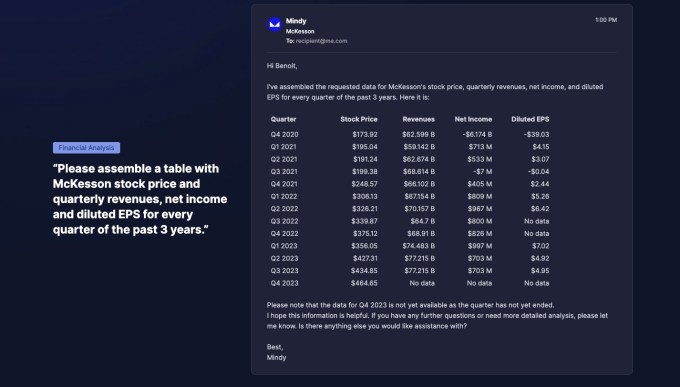Last year, there was an interest in agent-based AI approaches, such as AutoGPT. This year, we are seeing startups implementing some of these use cases of “let the AI do the work for you.” Mindy, which touts itself to be your email-based executive assistant, is one such example.
Using Mindy is pretty simple. You can email the assistant at m@mindy.com with a question like “I want to know about all the events happening in my area [you have to specify the area] this weekend with links to book tickets.” Or “Can you get me revenue figures of Apple in a table for last eight quarters?”
Mindy looks for that information across the web and responds with an email.

Image Credits: Mindy
Currently, Mindy is free to use as the company is figuring out the right price point for the service.
Why did the founders start Mindy?
Mindy was started by Yu Pan, Cuong Do and Benoit Berthoux last year. Pan was a founding engineer at both PayPal and YouTube. While Do joined PayPal in 2002, he was a founding engineer at YouTube. Berthoux has worked at consultancy firms including Capgemini and Accenture.
The company has raised $6 million in a seed round led by Sequoia Capital (with Roelof Botha as the lead partner) and Founders Fund.
“The germination of the idea came in 2022, when I was finishing up my work in the crypto side of things and Benoit was finishing up his initiative. AI was coming up with the rise in the popularity of models like GPT-3.5. It required a lot of prompt engineering to get anything done with these models. So we thought as these models are supposed to parse the language, tools shouldn’t require you to think a lot before using,” Pan said on a call with TechCrunch about starting the company.
Berthoux said when Mindy conducted market research, it found that people use apps like ChatGPT but forget about it. Notably, ChatGPT still has more than 100 million active users despite this.
The company started testing Mindy in a “semi-stealth” mode in November. But it didn’t specify how many users are interacting with Mindy.
Picking email as a differentiator
Pan said the company thought about building on email as it has a higher signal-to-noise ratio in terms of information, and it’s also focused on specific topics.
“Email is text-focused and our LLMs are text-focused. So we thought it was a great marriage. The way we looked at these mediums is like we’re trying to marry in essence, the oldest tech in the book with the newest tech,” he said.
The startup claims a lot of its users — ranging from financial analysts to students and defense contractors — use the bot to perform research. And since the AI assistant is on email rather than a web interface, they don’t expect the reply instantaneously.
The company thinks that as email and the conversational tone of the medium are familiar to people, they don’t have to change their workflow to adapt the product in their lives. Plus, you can use it with a group of other people while planning or ideating.
The company said because of the asynchronous nature of the email, the agent can have more autonomy or automation to get you relevant results.
While email is the primary focus for the company, it has tested other distribution channels as well for different use cases.
The company has a team of 10 people at the moment and wants to bring in people to accelerate growth with engineering courses. It is also exploring different models of monetization, including subscriptions, query limit or taking a fee from completed purchases. However, it hasn’t been finalized on a specific approach.
Sequoia’s Botha believes that Mindy has an advantage as a user-facing AI tool by removing complexity and utilizing email as a medium of communication.
“Unlike other AI assistant tools, Mindy removes complexity from the prompt engineering process and unlocks the benefits of generative AI for users by simply sending an email. What Yu Pan and the Mindy team have built is compelling, personalized, and accessible to all,” he said in a statement to TechCrunch
The agent-based approach
As my colleague Devin Coldewey wrote in his year-end article, we are looking at more AI-focused startups adopting an agent-based approach. Most recently, The Browser Company, which makes the Arc Browser, announced that it is developing an AI agent that browses the web for you.
An industry executive, who didn’t want to be named, said startups like Mindy that are trying to build an agent will have to build enough differentiation not to be overshadowed by the likes of ChatGPT. They said these tools will need to provide really high value to customers and find a way to acquire users cheaply.
Hemant Mohapatra, a partner at Lightspeed, thinks AI-assistant-based startups need to focus on user delight and reliability.
“Exceptional consumer apps often experience rapid growth in their early stages, fueled by strong consumer satisfaction and word-of-mouth referrals,” he said. Mohapatra noted for assistants to handle end-to-end requests, they will need more users’ data, and that means they have to concentrate more on compliance and security.
